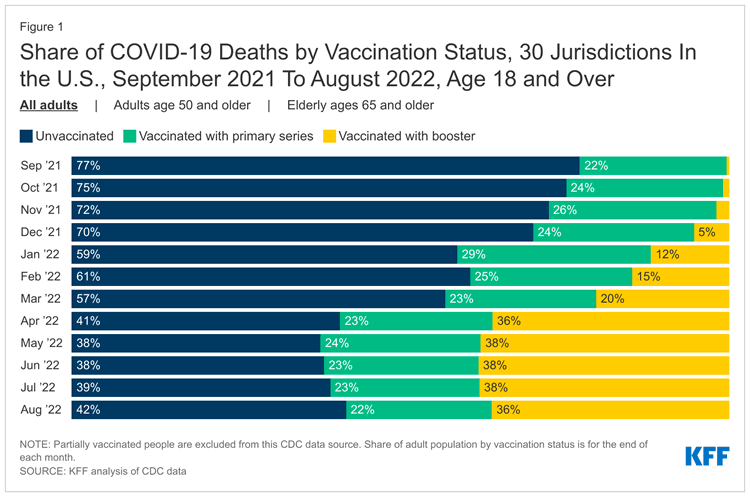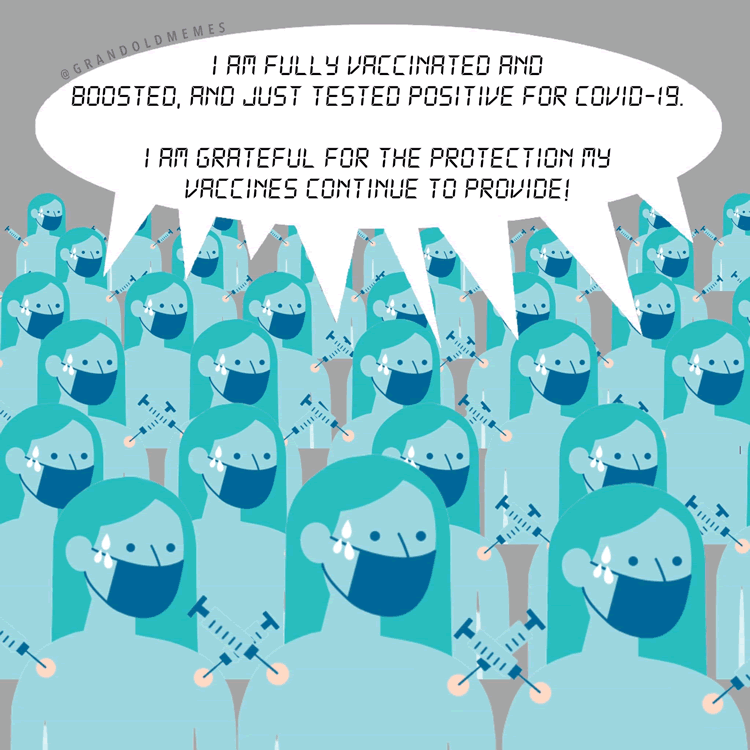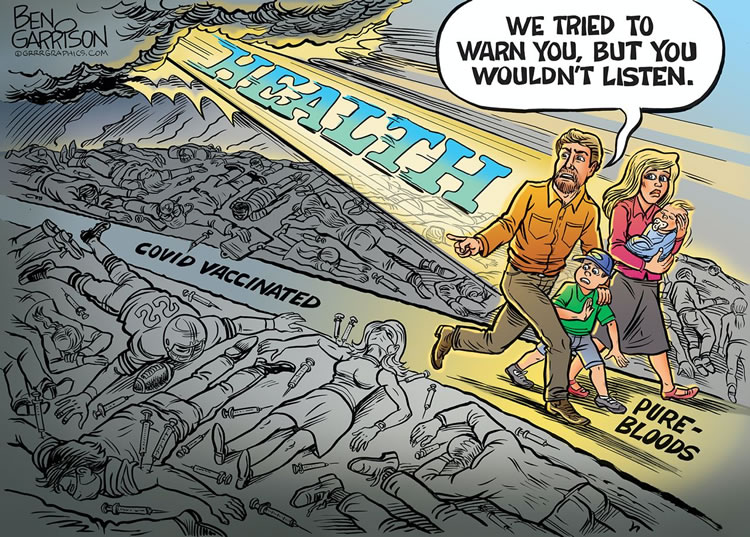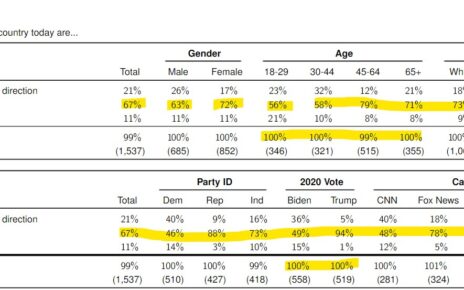Data from the Centers for Disease Control and Prevention (CDC) showed that vaccinated and boosted people made up most of the COVID-19 deaths in August.
Learn More: COVID VACCINE INJURIES
“We can no longer say this is a pandemic of the unvaccinated,” Cynthia Cox, the vice-president of the Kaiser Family Foundation told the Washington Post in an article dated Nov. 23.
Cox, while in support of COVID-19 vaccination, gave three reasons that may explain why.
One was that the majority of Americans have at least been given the primary series. Her second reason is that elderly, who have the greatest risk of dying from COVID, are also more likely to take up vaccinations.
Cox’s final reason was that the potency of the vaccine will wane over time and as variants become more resistant, and therefore recommended more booster uptake.
COVID-19 vaccination effectiveness has been shown to wane dramatically over the period of a few months, sometimes falling into negligible efficacy.
Professor Jeffrey Townsend from Yale University, biostatistician, and lead author to a research study evaluating natural and vaccinated immunity against COVID-19, wrote in an email to The Epoch Times that at this stage in the pandemic, rather than comparing the vaccinated against the unvaccinated, it is more helpful to look at an individual’s time since last exposure instead, with exposures meaning vaccinations or infections.
“Most people have had some kind of exposure, the time since last exposure, along with what the last exposure was, dictates the level of immunity and can explain most variation in susceptibility, morbidity, and mortality,” Townsend wrote.
Currently, long term studies on immunity against COVID-19 have shown that whether a person is vaccinated or infected with COVID-19, their immunity wanes over time.
Other research compared natural immunity with vaccinations often showed that vaccination tend to wane at a much higher rate than that of natural infection.
Some scientists also posited that mRNA vaccines may interfere with the body’s natural immune response. Since the current technology used in mRNA vaccines may “hide the mRNA from cellular defenses and promote a longer biological half-life and high production of spike protein,” according to a June 2022 paper published in Food and Chemical Toxicology. The spike protein is the main pathogenic part of the SARS-CoV-2 virus.
Clinicians Question ‘Pandemic of the Unvaccinated’ Narrative
Internal medical physician and cardiologist Dr. Peter McCullough told The Epoch Times that the pandemic was only driven by the unvaccinated in 2020, where there were no vaccines available, and from 2021 it was mostly the vaccinated people who were dying from COVID-19. He reasoned that it is simply because the vaccine did little to control mortality.
“[The CDC data] is far too late in drawing that conclusion, [the vaccinated] probably assumed the majority sometime during 2021,” said McCullough.
In 2020, more than 385,000 COVID deaths were documented by the CDC, whereas in 2021, when vaccinations were rolling out, there were more than 463,000 COVID-19 deaths.
By June of 2021, around 53 percent of the U.S. population had received their first dose and 44 percent were fully vaccinated.
Yet there was little difference in COVID-19 mortality cases between the first half of 2021 and the second half, with over 244,000 cases (more than 50 percent of the whole year) reported from July to December.
“It certainly can’t be a situation where we blame the unvaccinated for COVID deaths. And we certainly wouldn’t conclude that the vaccines made any impact on us as the majority of deaths happened during the era of vaccinations,” said McCullough.
Data from other countries have also demonstrated higher rates of vaccinated patients being hospitalized with COVID as vaccination rates overall rose.
As early as January 2022, hospitalization data coming out from the state of New South Wales (NSW) in Australia showed that a greater proportion of hospitalized patients were vaccinated. The vaccinated contributed to 50.3 percent of ICU presentations as compared to the 49.1 percent who were unvaccinated.
NSW was the only state that continued to track and publicize the vaccine status of the people being hospitalized in Australia. It is one of the most vaccinated places; by Nov. 24, over 80 percent of people over the age of 16 received their first boosters.
The most recent weekly data from NSW continued to show that the vaccinated make up the majority of COVID hospitalizations, ICU admission, and deaths. The most recent report, dated to Nov. 12, showed that unvaccinated patients contributed to 21 percent of COVID deaths, and less than 1 percent of hospitalizations and ICU admissions.
However, it should be noted that there was only 24 cases of COVID deaths reported in the report, with 440 hospitalizations and 40 ICU admissions, suggestive of a decline in disease severity.
Mortality data from Manitoba in Canada in the week July 31 to Aug. 6, 2022 also showed that while the boosted population made up 70 percent of all COVID mortalities, the unvaccinated contributed to less than 10 percent of deaths. This is with 43 percent of the population boosted.
Reports out of the UK also showed similar findings. A report (pdf) published on March 31, 2022 showed that almost 73 percent of COVID mortalities were in boosted individuals while 10 percent were attributed to unvaccinated people. At the time, over 57 percent of the population received a booster shot and 73 percent received their primary doses.

Unvaccinated Mortality Rates May Not Reflect the Whole Picture
McCullough added that with the decrease in overall disease severity with Omicron, the data may not present an accurate understanding on COVID deaths.
“The CDC death data has to be interpreted with caution, because they’re not adjudicated as dying of COVID. They can actually die with COVID.”
The CDC’s website currently estimates that only 10 percent of COVID-19 deaths have COVID as the contributor of deaths. Therefore, there may be cases counted as a COVID mortality even if COVID was not the primary driver for the death.
McCullough gave the example that a person may be admitted to the hospital for a heart attack and test positive on the COVID test from having contracted the disease 6 months ago.
This could imply that, for some deaths, “whether they’re vaccinated or unvaccinated is relatively irrelevant,” said McCullough.
McCullough said that studies that assess COVID hospitalizations but do not adjudicate for COVID diseases or respiratory illnesses may also not be directly reflective on the prevalence or significance of COVID diseases.
“Patients can be intermittently positive for COVID for many months after the illness. So if a patient comes in for an ankle sprain or unrelated problem, they can count it as COVID hospitalization.”
McCullough also warned that hospital studies on disease outcomes between vaccinated and unvaccinated individuals often collected vaccine data that was unsynchronized with the U.S. vaccine administration record.
“The hospital electronic medical records assume that the patient is unvaccinated unless the patient really makes the case that they are indeed vaccinated. Many patients who are on the ventilator are in the ICU, they can’t produce their vaccine card.” The CDC’s MMWR reports list people who were vaccinated but received their two primary shots less than 14 days before the initial infection as unvaccinated; another report wrote that unvaccinated also included people who could not be matched to the registry.
Correction: The Epoch Times cited the percentage in COVID deaths where COVID is the sole morbidity, rather than the percentage of COVID-contributed mortality. The percentage has been updated to 10 percent. The Epoch Times regrets the error.
We’re From The Government and Here to Help.





